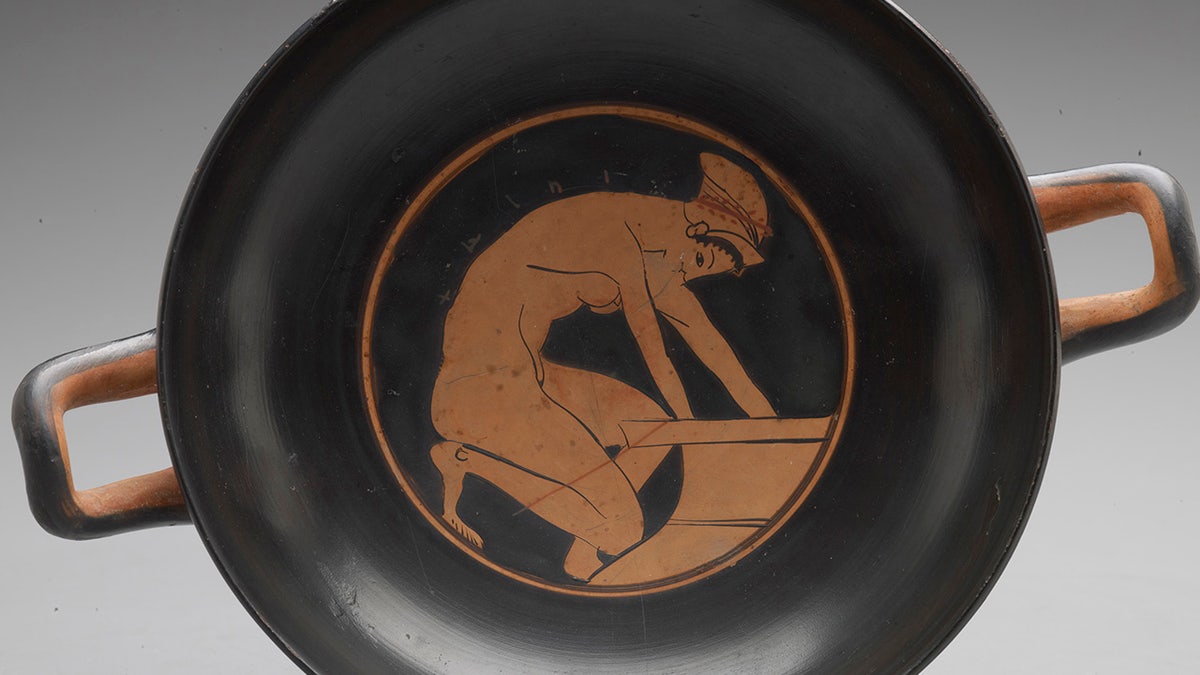Ancient tomb may have belonged to a courtesan with Alexander the Great’s army, archeologists reveal

[ad_1]
Israeli archeologists may have discovered the first-ever tomb of a woman known as a “hetaira” to Alexander the Great’s army in Ancient Greece.
A hetaira, or courtesan, was an “esteemed escort,” said the Israeli newspaper Haaretz.
More specifically, hetaira were “one of a class of professional independent courtesans of Ancient Greece who, besides developing physical beauty, cultivated their minds and talents to a degree far beyond that allowed to the average Attic woman,” said Encyclopedia Britannica.
WHY ARE MEN OBSESSED WITH THE ROMAN EMPIRE? HISTORY EXPERT SAYS IT’S A ‘VERY AMERICAN THING’
The tomb was discovered in 2019 alongside “strange grave goods” during a salvage expedition in Jerusalem’s Talpiot neighborhood, said Haaretz.
A paper discussing these findings is set to be published soon.
The woman was buried with “iron nails and an expensive mirror,” purportedly to accompany her to the afterlife.

Israeli archeologists believe they may have found the first-ever tomb of a Greek hetaira or courtesan. (Heritage Art/Heritage Images via Getty Images)
The mirror was described as bronze, and is “a rare and precious artifact that dates to the time of Alexander.”
Dr. Yossi Nagar, an anthropologist with the Israel Antiquities Authority, identified the bones as belonging to a woman who was about 20 to 30 years old when she died.
Alexander of Macedonia was criticized for investing not in graves for Greek soldiers who fell in the war against Persia — but for his hetairai.
The tomb, carved into limestone bedrock, is estimated to be about 2,300 years old, said Haaretz.
WHAT IS THE HISTORY OF MOTHER’S DAY? FIND OUT HOW THE GREEKS AND ROMANS CELEBRATED MOTHERHOOD
The age of the tomb was estimated by the style of the mirror that was found with the bones.

Alexander the Great’s army was known to employ hetairai. The first-ever tomb of one of these women may have been discovered. (Fine Art Images/Heritage Images/Getty Images)
“We know [the hetairai] were buried on roadsides,” archeologist Dr. Guy Stiebel of Tel Aviv University told Haaretz.
“Alexander of Macedonia was even criticized for investing not in graves for Greek soldiers who fell in the war against Persia, but for his hetairai, on the main road, from a point where they could see Athens and the Parthenon for the first time,” he added.
“Maybe we can, cautiously, see a correlation here.”
In Ancient Greece, the process of cremation did not turn a body to ash, but rather left bones behind.
Archaeologists who studied the tomb told Haaretz they believe the woman was cremated.
“The disarticulated bones were found on the burial chamber floor and showed signs of charring, attesting to cremation — the earliest found in Israel from the Hellenistic period,” said Haaretz.
ANCIENT GREEK THRONE ROOM MAY HAVE BEEN DISCOVERED IN GIANT PALACE
In Ancient Greece, the process of cremation did not turn a body to ash, but rather left bones behind, the publication said.
Stiebel of Tel Aviv University said that the presence of the mirror is another sign the tomb belonged to a woman.
CLICK HERE TO SIGN UP FOR OUR LIFESTYLE NEWSLETTER
“The mirror was a gender-specific artifact, identified in the ancient period only with women,” he told the newspaper, adding that there are “no ancient depictions” of men looking at themselves in mirrors.

A depiction of a hetaira dating from about 500 B.C. (Indianapolis Museum of Art/Getty Images)
The fact that the woman was found far from home in Jersualem is why the researchers theorize that the woman was a hetaira, rather than the wife of a soldier or officer.
In Ancient Greece, wives did not accompany their husbands to war — they would have stayed at home, Steibel told Haaretz.
“Also, there are records of hetairai in exalted positions, and specifically on Alexander’s campaigns,” said the newspaper.
CLICK HERE TO GET THE FOX NEWS APP
“We know from historic records that this was happening and we know that some joined generals or rulers on their campaigns — famously, the hetaira Thais joined Alexander on the road and he didn’t like her to be far,” Stiebel told Haaretz.
“When they conquered Persepolis, Thais was the one who some say stood behind the decision to burn the city to the ground,” he added.
Further tests are expected to reveal more about the identity of the woman and the army she may have been traveling with, according to the Times of India.
For more Lifestyle articles, visit www.foxnews.com/lifestyle.
[ad_2]